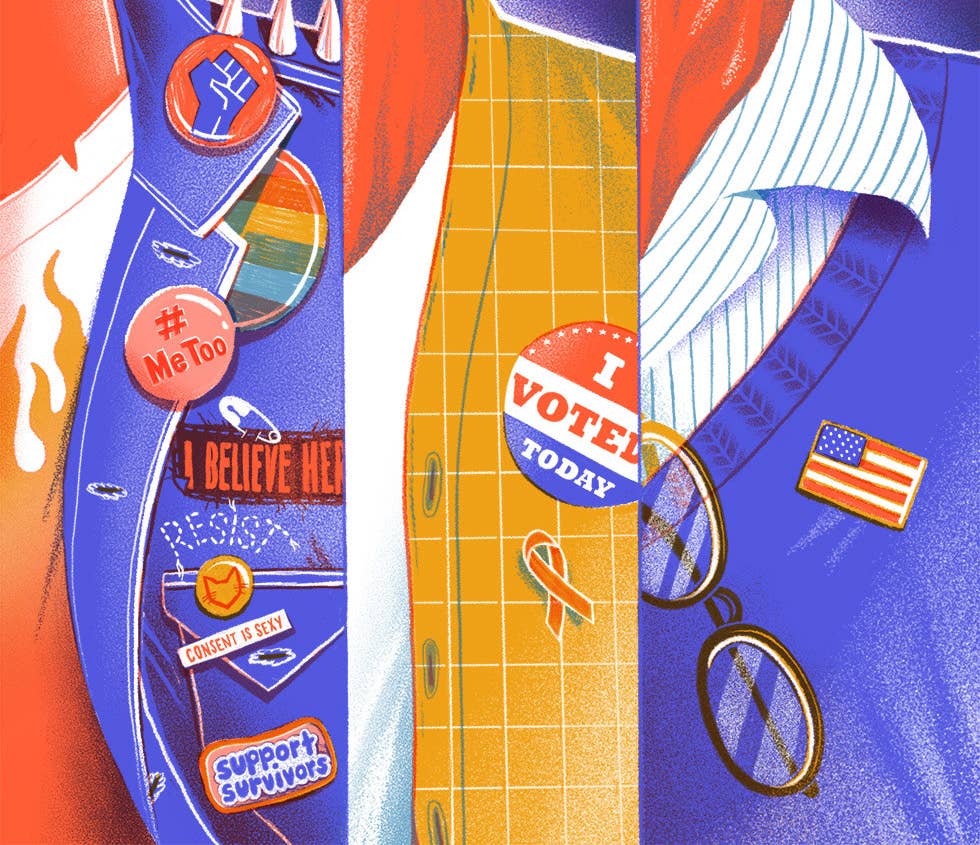
In October 2017, reports of Harvey Weinstein’s serial sexual harassment and assault first broke in the New York Times, followed by additional investigations in the New Yorker. The Weinstein story sparked a chain reaction of further revelations about powerful figures’ abusive behavior, and an ongoing national conversation about sexual harassment and assault in the workplace and in our lives.
A year later, we wanted to know: How much progress have we made in thinking and talking about these issues? What’s changed, and what hasn’t? BuzzFeed News partnered with Ipsos to conduct a survey of 2,011 Americans to get a sense for how they see the #MeToo movement now.
The results suggest that #MeToo has been meaningful for most people: 71% of Americans are familiar with the movement, and 57% think that #MeToo will have a lasting positive impact on society. But there are some notable differences of opinion along partisan and gender lines, and, maybe most interestingly, several results that suggest a persistent generational divide.
1. Thirty-nine percent of people between the ages of 18 and 34 said they are "very" familiar with the #MeToo movement vs. 21% of people ages 55 and up.
2. And while 42% of people between the ages of 18 and 34 agree that #MeToo changed the way they think about consent, the same can be said for only 29% of people ages 55 and older.
#MeToo changed the way I think about consent:
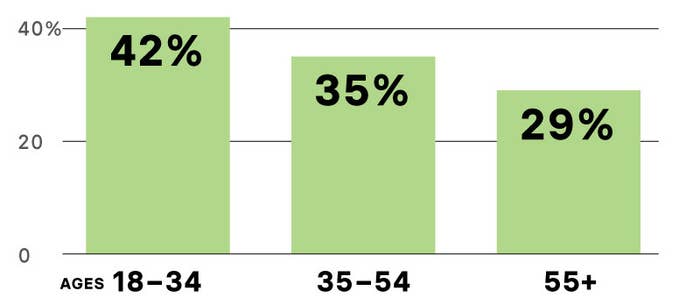
3. Sixty-four percent of people between the ages of 18 and 34 agree that women who say they have been victims of sexual harassment or sexual assault should be believed no matter what, vs. 38% of people ages 55 and up. (The split is similar when asked if men should be believed, although a slightly higher percentage of both groups responded yes, with 66% of people ages 18 and 34 saying yes vs. 42% of people ages 55 and up.)
Women who say they have been victims of sexual harassment or sexual assault should be believed no matter what:

4. Twenty-nine percent of people ages 18 to 34 believe the prominent people accused of sexual harassment and/or assault during the #MeToo movement have been adequately punished, compared to 18% of people 55 and up.
5. Forty-nine percent of people between the ages of 18 and 34 would not vote for a political candidate accused of sexual assault or harassment, compared to 34% of people ages 55 and over.
I would not vote for a candidate who has been accused of sexual harassment or assault:
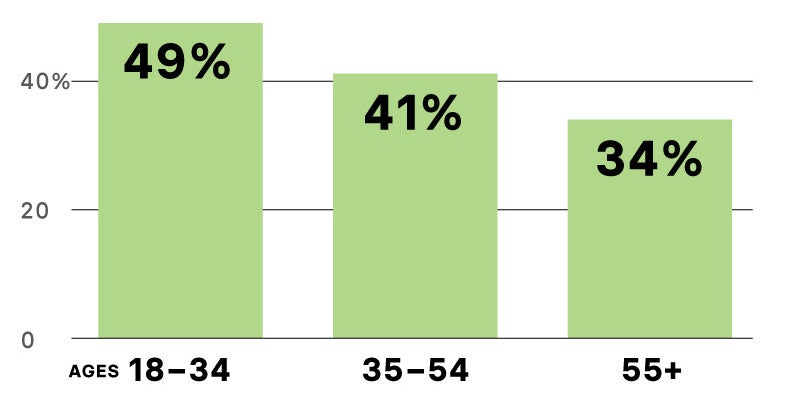
There were significant partisan divides as well:
Forty-eight percent of Democrats think that #MeToo has changed the way they think about consent vs. 26% of Republicans.
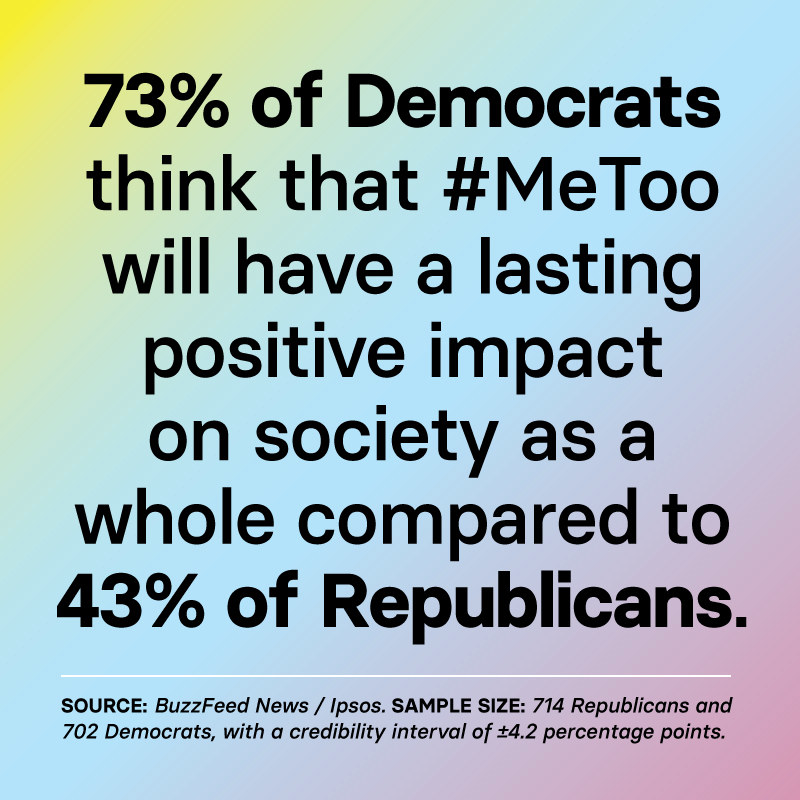
Eighty percent of Democrats think that the #MeToo movement will have a lasting effect on the way society thinks about sexual harassment and/or assault in the workplace vs. 56% of Republicans.
Republicans (51%) are also more likely than Democrats (23%) to believe that the movement has lost sight of its original goals.
69% of Republicans agree that some people have been unfairly accused vs. 47% of Democrats.
Here are some more general conclusions from our survey:
Fifty-seven percent of respondents believe that people forced from positions of authority after sexual misconduct comes to light should never be allowed to regain their positions.
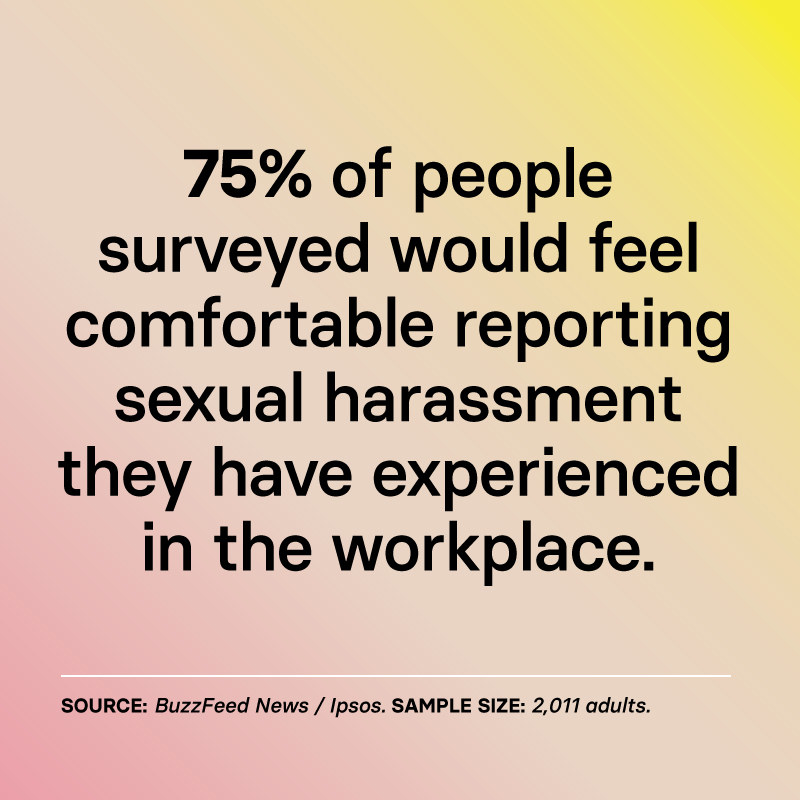
Fifty percent of people surveyed do not think Clarence Thomas would be confirmed today in light of #MeToo. There was a strong partisan divide, however: 65% of Democrats think he would not be confirmed vs. 36% of Republicans. ●
These are findings from an Ipsos poll conducted Sept. 18–20, 2018, on behalf of BuzzFeed News. For the survey, a sample of roughly 2,011 adults 18+ from the continental US, Alaska, and Hawaii were interviewed online in English. The sample includes 852 men, 1,159 women, 714 Republicans, 702 Democrats, 384 Independents. The sample for this study was randomly drawn from Ipsos’ online panel (see link below for more info on “Access Panels and Recruitment”), partner online panel sources, and “river” sampling (see link below for more info on the Ipsos “Ampario Overview” sample method) and does not rely on a population frame in the traditional sense. Ipsos uses fixed sample targets, unique to each study, in drawing a sample.
After a sample has been obtained from the Ipsos panel, Ipsos calibrates respondent characteristics to be representative of the US population using standard procedures such as raking-ratio adjustments. The source of these population targets is US Census 2013 American Community Survey data. The sample drawn for this study reflects fixed sample targets on demographics. Post-hoc weights were made to the population characteristics on gender, age, race/ethnicity, region, and education. Statistical margins of error are not applicable to online polls.
All sample surveys and polls may be subject to other sources of error, including, but not limited to coverage error and measurement error. Where figures do not sum to 100, this is due to the effects of rounding. The precision of Ipsos online polls is measured using a credibility interval. In this case, the poll has a credibility interval of plus or minus 2.5 percentage points for all respondents. Ipsos calculates a design effect (DEFF) for each study based on the variation of the weights, following the formula of Kish (1965). This study had a credibility interval adjusted for design effect of the following (n=2,011, DEFF=1.5, adjusted Confidence Interval=+/-4 percentage points). The poll also has a credibility interval plus or minus 3.8 percentage points for men, 3.3 percentage points for women, 4.2 percentage points for Republicans, 4.2 percentage points for Democrats, and 5.7 for Independents.

A year after #MeToo became a household name, BuzzFeed News is bringing you stories about how far we’ve come, who’s been left out, and where we go from here. Read more here.
